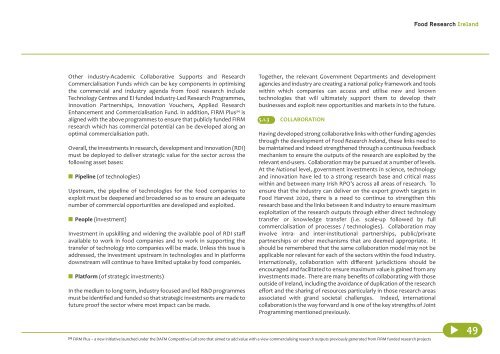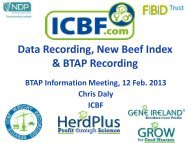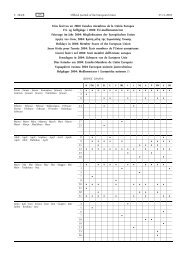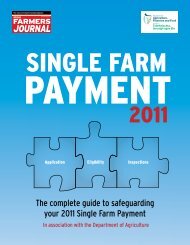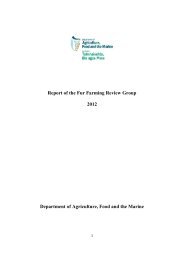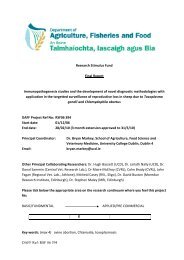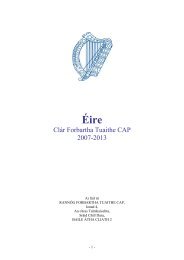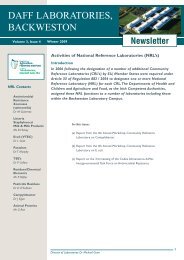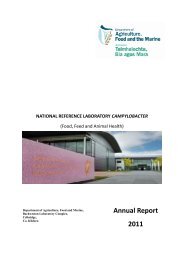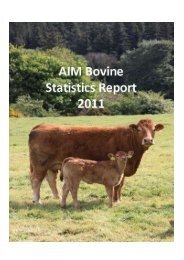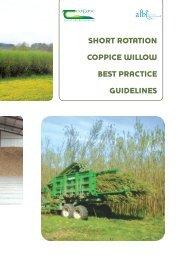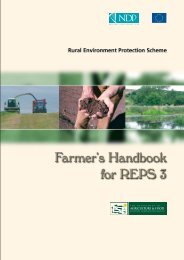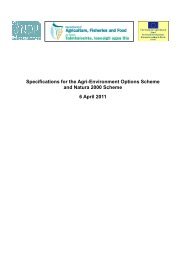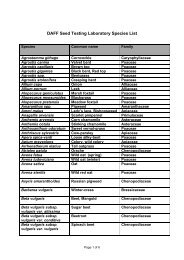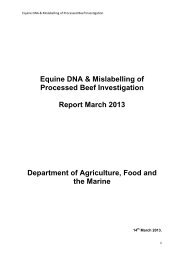Food Research Ireland - Department of Agriculture
Food Research Ireland - Department of Agriculture
Food Research Ireland - Department of Agriculture
Create successful ePaper yourself
Turn your PDF publications into a flip-book with our unique Google optimized e-Paper software.
Other industry-Academic Collaborative Supports and <strong>Research</strong><br />
Commercialisation Funds which can be key components in optimising<br />
the commercial and industry agenda from food research include<br />
Technology Centres and EI funded Industry-Led <strong>Research</strong> Programmes,<br />
Innovation Partnerships, Innovation Vouchers, Applied <strong>Research</strong><br />
Enhancement and Commercialisation Fund. In addition, FIRM Plus 34 is<br />
aligned with the above programmes to ensure that publicly funded FIRM<br />
research which has commercial potential can be developed along an<br />
optimal commercialisation path.<br />
Overall, the investments in research, development and innovation (RDI)<br />
must be deployed to deliver strategic value for the sector across the<br />
following asset bases:<br />
■ Pipeline (<strong>of</strong> technologies)<br />
Upstream, the pipeline <strong>of</strong> technologies for the food companies to<br />
exploit must be deepened and broadened so as to ensure an adequate<br />
number <strong>of</strong> commercial opportunities are developed and exploited.<br />
■ People (investment)<br />
Investment in upskilling and widening the available pool <strong>of</strong> RDI staff<br />
available to work in food companies and to work in supporting the<br />
transfer <strong>of</strong> technology into companies will be made. Unless this issue is<br />
addressed, the investment upstream in technologies and in platforms<br />
downstream will continue to have limited uptake by food companies.<br />
■ Platform (<strong>of</strong> strategic investments)<br />
In the medium to long term, industry focused and led R&D programmes<br />
must be identified and funded so that strategic investments are made to<br />
future pro<strong>of</strong> the sector where most impact can be made.<br />
Together, the relevant Government <strong>Department</strong>s and development<br />
agencies and industry are creating a national policy framework and tools<br />
within which companies can access and utilise new and known<br />
technologies that will ultimately support them to develop their<br />
businesses and exploit new opportunities and markets in to the future.<br />
5.1.3 COLLABORATION<br />
Having developed strong collaborative links with other funding agencies<br />
through the development <strong>of</strong> <strong>Food</strong> <strong>Research</strong> <strong>Ireland</strong>, these links need to<br />
be maintained and indeed strengthened through a continuous feedback<br />
mechanism to ensure the outputs <strong>of</strong> the research are exploited by the<br />
relevant end-users. Collaboration may be pursued at a number <strong>of</strong> levels.<br />
At the National level, government investments in science, technology<br />
and innovation have led to a strong research base and critical mass<br />
within and between many Irish RPO’s across all areas <strong>of</strong> research. To<br />
ensure that the industry can deliver on the export growth targets in<br />
<strong>Food</strong> Harvest 2020, there is a need to continue to strengthen this<br />
research base and the links between it and industry to ensure maximum<br />
exploitation <strong>of</strong> the research outputs through either direct technology<br />
transfer or knowledge transfer (i.e. scale-up followed by full<br />
commercialisation <strong>of</strong> processes / technologies). Collaboration may<br />
involve intra- and inter-institutional partnerships, public/private<br />
partnerships or other mechanisms that are deemed appropriate. It<br />
should be remembered that the same collaboration model may not be<br />
applicable nor relevant for each <strong>of</strong> the sectors within the food industry.<br />
Internationally, collaboration with different jurisdictions should be<br />
encouraged and facilitated to ensure maximum value is gained from any<br />
investments made. There are many benefits <strong>of</strong> collaborating with those<br />
outside <strong>of</strong> <strong>Ireland</strong>, including the avoidance <strong>of</strong> duplication <strong>of</strong> the research<br />
effort and the sharing <strong>of</strong> resources particularly in those research areas<br />
associated with grand societal challenges. Indeed, international<br />
collaboration is the way forward and is one <strong>of</strong> the key strengths <strong>of</strong> Joint<br />
Programming mentioned previously.<br />
34 FIRM Plus – a new initiative launched under the DAFM Competitive Call 2010 that aimed to add value with a view commercialising research outputs previously generated from FIRM funded research projects<br />
<strong>Food</strong> <strong>Research</strong> <strong>Ireland</strong><br />
▼<br />
49


